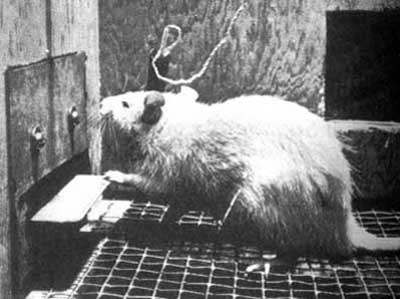• Secrecy
helps freaks
- Nobody has a right to deceive us!
Daniel Lynch had been convicted for
violent acts, and had spent
time in jail for throwing
boiling water into a
man's face. Lisa Harris didn't care about his
violent past,
but it's possible that Katie Piper would have avoided him if she had
known.
However, a lot of information about people is either secretive, such as
school and medical records, or difficult to access, such as police
records.
As I described in my audio file for 19_April
2008, we should differentiate between privacy
and secrecy.
People deserve privacy
in the bathroom or bedroom, but they should not be able to keep their "behavioral
characteristics" a secret. We should be able to
know how a person
has treated other people, what he has accomplished during his life,
what
he has failed at, whom he associates with, and his mental or physical
talents,
limitations, and disorders.
As I described in my audio file for 21_November
2009, we should put people into the equivalent of an acid
bath to determine what they really are. The only
people who
are afraid of a close inspection are those who are trying to hide
something from us. Don't be fooled into thinking
that these
people are trying to "protect our rights".
My attitude is that we have a right to know a
person's history. We have
a right to know who we live with, work with, and are considering a
relationship
with. Nobody has a right to pretend that they are something they are
not.
Nobody should have the right to deceive us about who they are, or what
they've done during their life, or how they treat other people.
Instead,
we
have a right to know the truth about people.
• Our policies on
crime are failing
Before Piper had met Lynch, he had
already exhibited violent
behavior, and he had already been arrested. He was put in jail for a
brief
period of time, but the jail didn't convert him into an honest person.
Rather, he left the jail with the same personality, mental qualities,
and
physical qualities as when he entered the jail. His body and mind had
aged
a bit, but he was still the
same person.
Jail did not change him;
jail did not
improve him. Jail is not
preventing
crime.
Our policies for crime have been failing continuously
all throughout history, but every society continues to defend these
failed
policies. We need a new group of people in control of society who will
start
experimenting with different policies.
Both Lynch and Sylvestre have been sentenced to
life imprisonment. However,
Sylvestre has to serve only a minimum of 12 years, and Lynch has a
minimum
of 16 years, and my interpretation of the 20/20 television report is
that
both of them will be released after they serve their minimum time. I
wouldn't
be surprised if one or both of these men commit more
crimes after they are released.
• Many people have no
faith
that our legal system will protect us from criminals
Piper was afraid to tell the police and
doctors about the rape
and beating because she had no faith that the British legal system
would
protect her from him. Some of her friends and family members apparently
knew that she had been abused, but they said nothing, either. I suspect
that this attitude is typical; namely, most people
are afraid to
expose crimes, especially those of crime networks, because we don't
have
much faith that our legal system will protect us from the criminals.
The police are often doing their job; namely,
arresting the criminals,
but the judges and juries either let them go free, or punish them for a
brief period, and then let them go free.
• We should stop
following the “buyer
beware” policy
The attitude many people have in regards
to Katie Piper is
that
women should be more careful about who they trust and who they get
involved
with. However, telling women to be suspicious and fearful is not
solving any problem, and it's not
improving society
in any way. Rather, it's hiding
from
the problem like a stupid
animal.
In Part 1 of my audio file for 2_July
2008 I pointed out that the buyer
beware attitude
is a crude attitude that we should not follow in our era. I also
discussed
some aspects of this issue in 2005 in my article Teddy
Bears, one of the articles in my Sheeple
and Underdog Psychology series.
Animals and primitive humans had
to be
suspicious of everything,
but we should
not
be fearful or suspicious of one another. We
should not have
to carry guns to protect ourselves, and we should not have to worry
that
our children will be molested at schools, and we should not have to
worry
that somebody will attack us if we take a walk in our city at night. We
should change our attitude; we should change society so that it becomes
safe
enough for us to trust one another.
• Humans tolerate
abuse like a stupid
animal
Katie Piper has a lot to say about her
experiences with Daniel
Lynch, and so do the television reporters and other people who comment
on her case, but I would describe all of their analyses as worthless
and idiotic.
For example, Katie Piper
has a “Christmas message”
for 2009, with such idiotic remarks as:
“My life
before was very selfabsorbed, self-obsessed.
It took a tragedy for me to reassess what I
thought was important.
Don't wait 'til there is tragedy in
your life. Don't wait 'til you
lose somebody.”
|
|
| Most people react to abuse like a dog
that is beaten or abused by its
owner. Specifically, they
try to make themselves feel better by finding something that has
improved
in their life, and then claiming that the abuse has made them into a
better
person.
We have an expression for this behavior:
When life
gives you lemons, make lemonade.
|
|
 |
| Most people don't care
that they
were abused by Jews during 9/11, or that NASA lied to them about the
Apollo
moon landing. Most people just lick their wounds - like a stupid
dog. |
|
 |
We
need to improve
society in addition
to making lemonade.
It's wonderful that victims of abuse are making
themselves feel better;
it would be terrible if they spent the rest of their lives being
miserable.
However, we need people who do
more than make
lemonade. Women are beaten all the
time, and so are men and children. There's also
a lot of murders,
robberies, rapes, wars, and corruption. We're not going to improve life
for us by making lemonade from the abuse.
We need people who can study
our
problems, discuss
them in a serious
manner, and then experiment
with changes
in society in an attempt to reduce
the problems.
We
have to stop acting like stupid
animals
who tolerate abuse and start behaving like modern, advanced humans who
try to improve
our situation and
reduce the abuse.
• We follow our emotions,
not our intellect
Both Katie Piper and Lisa Harris fell in
love with Daniel Lynch
because he made them feel good; he
titillated
their emotions. Neither woman was thinking
seriously about the
issue. Instead, they were doing whatever
made
them feel good.
Primitive animals, such as termites, don't think
about issues. Rather,
they react
to stimuli in a very predictable
manner, just like chemicals reacting in a test tube, or like industrial
robots.
The more advanced animals have an ability to
think, and so they're not
as predictable as termites, but even a chimpanzee is dominated by its
emotions.
Monkeys don't received any emotional pleasure from information or from
doing research. Rather, they receive emotional pleasure from food, sex,
babies, and status. Therefore, if you want to attract a monkey, don't
offer
it information or a job opportunity in a research laboratory. Instead,
offer it food, or something it has an emotional attraction to.
• Human emotions
were designed for
a simple life
| It would be acceptable for us to follow our
emotions if our emotions
had been designed for modern society, but our emotions were designed
for
life in a small, primitive tribe. We assume other people can be trusted,
for example. We were not designed to investigate people or wonder if
they
are lunatics who might hurt us. We were not designed to vote for
government
officials, either, or deal with people of other races, or deal with
large
amounts of material items, money, or food. Our emotions were not
designed
to handle drugs or alcohol, or packs of criminal Jews, either. |
|

|
| Humans can think much better than animals,
but we don't receive emotional
pleasure from thinking, or from learning, or from doing research, or by
discussing complex problems. Instead, as with animals, we are
emotionally
titillated by food, sex, babies, material items, and praise. Therefore,
when we follow our emotional cravings, we end up behaving
like a stupid animal.
Since we tend to follow our emotions,
businesses, political parties,
websites, and crime
networks can attract
people by offering us food, gifts, pornography, sex, or praise and
awards.
We have to remind ourselves to think more often rather than do whatever
makes us feel good. We have to control our emotional cravings.
|
|
 |
Human
leisure time activities
It might help you understand this concept when
you look at how people
spend their leisure time, and then compare what people actually
do to what people would be doing if
humans truly enjoyed thinking.
| What
do we actually
do during our leisure
time?
The subtle differences between us cause us
to engage in different activities
during our leisure time. The most popular leisure activity, at least in
America, seems to be watching television. Other popular activities are
playing with children or dogs, playing video games, and using alcohol
or
other drugs, gambling, shopping, or playing sports.
|
|

|
| What
would
we
do if we enjoyed
thinking?
If we truly enjoyed thinking, doing
research, and solving complex problems,
then we would love to get together with our friends during our leisure
time to study and discuss such issues as whether oxygen degrades wheat
or other grains, in which case whole-grain bread should be made by
grinding,
mixing, and baking the bread in nitrogen.
People with abnormally strong cravings to
think, and people who are
so anti-social that they don't have any friends, might be tempted to
pay
an "intellectual prostitute"
for discussions.
|
|
 |
Which leisure
time activities are "sensible"?
Humans are much more intelligent than animals,
but we don't
want to think. We want to enjoy
ourselves,
but we don't receive any emotional pleasure from thinking, so we avoid
doing it. We regard thinking as "work". Our natural tendency is to
"play",
not "work". We regard an activity as "play", or as "leisure", or as
"fun",
when it stimulates our emotions, but we are not titillated by thinking.
Rather, we consider it to be a boring chore.
A lot of our leisure time activities could be
described as worthless
or unproductive, and as technology gets more advanced, the human race
will
eventually have to pass judgment on which activities should be
supported
by society, and which should be discouraged. Technology allows us to
develop
products that enable us to stimulate our emotions directly, thereby
avoiding
normal human activities. This issue is especially important in regards
to children.
| Allowing children to stimulate themselves
with television, video games,
and other products is similar to allowing a rat to press a lever to
stimulate
its brain.
Our distant ancestors didn't have to worry
about how children spent
their time, but this issue is affecting us now, and it will become an
even
more significant issue for future generations. For example, some
businesses
are developing virtual reality computer games, but do we want children
spending hours a day in a 3-D computer fantasy world?
An adult should have the sense to control
his use of television, alcohol,
pornography, drugs, video games, and virtual reality games, but we are
fools to expect children to make wise decisions about this technology.
At some point in the future the human race
is going to have to start
passing judgment on which products and activities are sensible for both
adults and children, and which should be prohibited, and which should
be
restricted to adults only.
|
|


|
By
changing society, we could encourage
better activities
In my description of a city of castles,
I suggested that the castles be designed with lots of restaurants,
enclosed
gardens, lounges, and other social areas in order to encourage people
to
get
out of their home and socialize. By
experimenting with different
types of cities, economic systems, government systems, and school
systems,
we might be able to create a society that we enjoy so much that we have
little or no desire to sit by ourselves in our home with a television
or
video game.
Sitting in a lounge and socializing with other
people, or taking a walk
in a garden, or sitting in a recreational room and listening to people
play music could be described as unproductive and useless.
However, it's not the same as a person sitting by himself in his home.
As I've described before, we have to decide what we want the human race
to become. Do we want the human race to become a creature that spends
its
time alone and stimulating itself with pornography, drugs, television,
and video games?
Nature used to determine which humans reproduce
successfully, but now
we have to make the decisions. What type of person do we want for the
next
generation of humans? Do we want people who prefer to spend their
leisure
time on drugs or connected to virtual reality games?
There are subtle differences between our
emotional and intellectual
characteristics. Some people prefer to spend their leisure time
socializing,
or playing sports, or helping their friends with their computers or
home
repairs. And some people enjoy doing things for society, such as
joining
the National Guard, or helping with some school related activity. And
some
people like to sing or play music for their friends. And some of us
spend
some of our leisure time on very serious work. For example, I created
this
website during my leisure time to provide you with a different view of
life, and I also created some videos about food.
 Incidentally,
I
never liked eggs, so I avoided eggs throughout
my life, except
when they were an ingredient in some other food, such as a pie or
quiche.
I especially don't like hard-boiled eggs because they remind me of
sulfur. Incidentally,
I
never liked eggs, so I avoided eggs throughout
my life, except
when they were an ingredient in some other food, such as a pie or
quiche.
I especially don't like hard-boiled eggs because they remind me of
sulfur.
However, after discovering this
method of cooking eggs in their shells at a lower temperature, I
love eggs, especially on toast, and I'm
wondering if it's because
my sense of taste has changed with age. If my mother made eggs like
this
when I was a child, would I have liked them?
Our eyes change with age, which is why
people over 50 need reading glasses.
And our body changes with age, also. What about our sense of taste and
smell? Do I like these eggs only because I'm
getting
old? Have you
tried my style
of cooking eggs? Do you think they taste better than eggs cooked in a
conventional
manner?
|
• Humans are not
wonderful
creations of a loving God
Most people follow the philosophy that
humans and animals are
wonderful creatures of a loving God. These people are the most likely
people
to become victims of both
animals and
humans. They can be hurt by animals because they don't understand that
animals are actually violent, selfish, stupid creatures. Some extreme
examples
are the woman whose face was ripped
off by a pet chimpanzee, and the photographer whose arm was ripped
off by a tiger at a zoo, and the man who got tarantula hairs
in his eye.
Animals are stupid, biological robots. Their only
goal is to survive long
enough to reproduce.
Animals will do anything
to help themselves
and their offspring. Animals don't appreciate other animals, and they
don't
work with other animals to make life better for all creatures.
Humans are just intelligent animals.
However, we differ in how
closely we resemble animals, and we differ in our mental
health. If you assume that all humans are
wonderful creatures,
you won't watch out for the people who are more like an animal, or who
are defective. As a result, you are more likely to become a victim of
badly
behaved people compared to those of us who are watching out for them.
Daniel
Lynch and his friend Stefan Sylvestre are two examples, and here are
four
more:
| Trent Perault was arrested
for raping his girlfriend's two-year-old
baby. |
|
|
| Raymond Chapman, an employee of the Georgia
Baptist Children's
Home, was arrested
for raping a child he was in the process of adopting. |
|
|
| Dr. Earl Bradley, a pediatrician,
was arrested
for sexually abusing the children he was providing medical services to. |
|
|
| Steven Hughes was arrested for sexual
exploitation and child pornography.
He was a foster
parent, a Santa
Claus who specialized in making in-home
visits, and had a photography studio that
specialized in taking
pictures of young children.
|
|
|
Incidentally, it seems like a lot of
pedophiles have taken
jobs that provide them with access to children. Ideally the police
would
look through their records and try to find patterns because if this
observation
is accurate, then we would realize that we have to do a much better
investigation
of the men who want these type of jobs, and we have to watch over them
much more closely.
• Humans who are destructive
should be
removed
If Daniel Lynch had been removed from
society permanently
as soon as he showed signs of destructive behavior, then he never would
have been able to cause much trouble. Many adult criminals were showing
signs of mental disorders while they were children or teenagers. The
warning
signs were there; most people simply ignored them. Most people don't
want
to face the possibility that badly behaved children are very likely to
become badly behaved adults.
Humans are not wonderful creations of God who
become criminals or parasites
after suffering abuse from their parents, or from poverty or ignorance.
Rather, humans are intelligent
monkeys.
We all have exactly the same mental and physical qualities, but we are
not
identical to one another. There are
subtle differences
in our abilities, and we also have slightly different types of defects
and disorders. The end result is that some people are more like
monkeys,
and some people have more serious defects.
Some of us do a good job of controlling our
cravings for sex, food,
babies, attention, and material items, while other people have so
little
control over themselves that they cheat, steal, lie, plagiarize, and
murder
in order to satisfy their cravings. Some of us are capable of working
together
for the benefit of all, while others are too selfish or arrogant. We
don't
have the technology to fix people who are destructive. The only thing
we
can do is remove them from society.
• The human race is
on a path to destruction
We are allowing parasites, criminals,
lunatics, and freaks
of all sorts to live among
us and have
as
many babies as they please. Furthermore, many of
these freaks
are getting into top positions of our military,
police departments,
school system, businesses, and governments, and they are using their
influence
to suppress attempts to deal with crime and mentally ill people. These
freaks also promote destructive attitudes and activities, such as the
concept
that state lotteries
are a sensible
way for society to raise money for schools, and the concept that work
furloughs are a sensible way of solving
government budget problems
(I have a joke about that here).
We must find enough people who are willing to stand
up to the freaks in leadership positions and
change the course
of the human race. We have to promote respectable, healthy people and
suppress
the destructive, parasitic, and affected people.
Our law enforcement agencies should look
for and remove
people who
show destructive behavior. Furthermore, this concept applies to children,
also. From my own personal observations, many of the adults who are
destructive
or parasitic were showing signs of emotional problems during
their childhood. Therefore, they could have been
identified
and removed before they had become adults. We should stop referring to
children as precious, adorable, or as "bundles of joy" and start
treating
them as young humans.
We can't expect children to behave as well as
adults, but we must set
standards of behavior for children, and we must deal with children who
don't meet the standards. We have to stop feeling sorry for them simply
because they're children. Furthermore, we must suppress our animal-like
craving to protect our
own children.
Everybody who is destructive should be removed from society, even if
they
are closely related to us.
| Nancy
Broadhead, a divorced woman
living with her daughter and two sons, was arrested for child neglect
and
driving under the influence of alcohol. The police also accused her of
getting drunk and punching her seven-year-old daughter, but she was not
arrested for that. The girl told police that her mother "repeatedly
hits
her," and that she was in fear of her. |
|

|
Should Nancy Broadhead have been arrested
for beating her seven-year-old
daughter? Should the daughter had been put into a foster home? Most
people
would assume that the seven-year-old daughter was a sweet, adorable,
innocent
victim of a brutal mother, but if you follow my philosophy, the
seven-year-old
daughter was likely to be a defective
child
of defective parents.
It doesn't surprise me that on December 29,
2009, the daughter, then
11 years old, along with her 15-year-old boyfriend - who had already
been
arrested
many times during his childhood - poured
gasoline on her mother's
bed while she was sleeping in order to burn her to death.
|